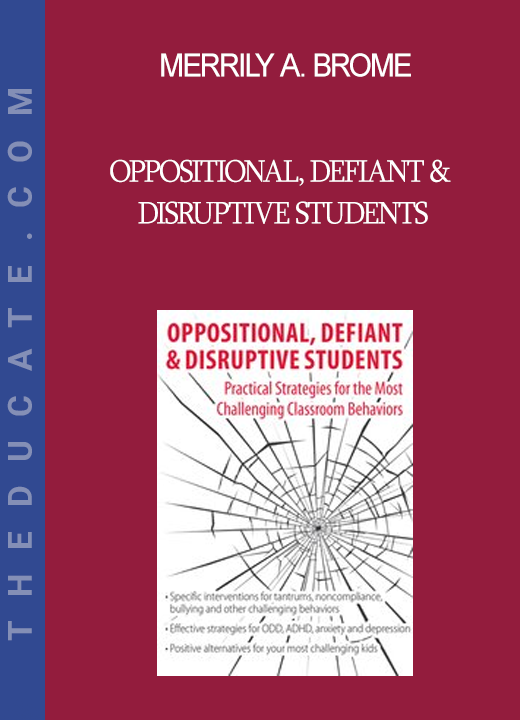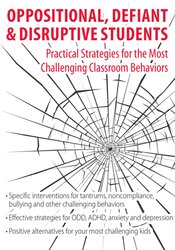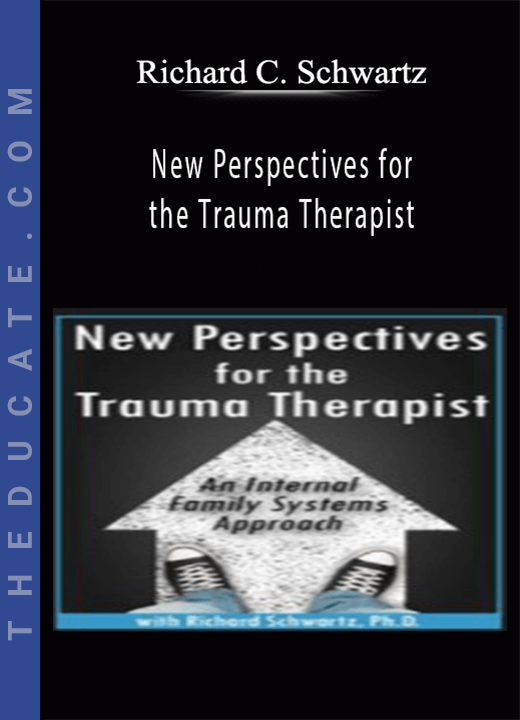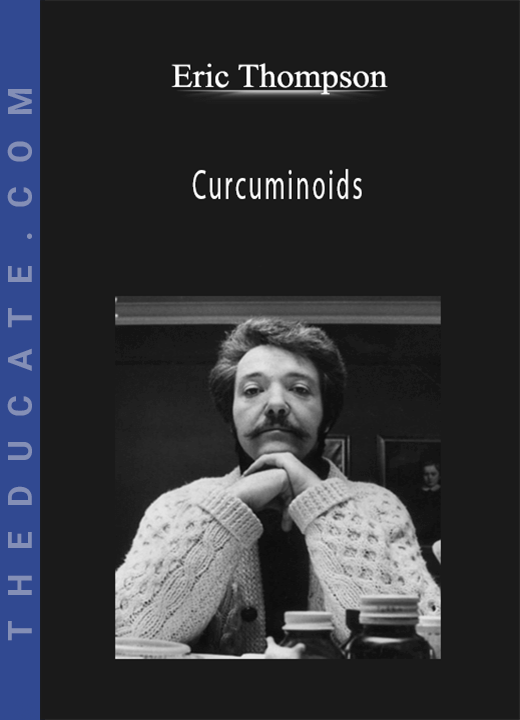Description
-
Merrily A. Brome – Oppositional, Defiant & Disruptive Students: Practical Strategies for the Most Challenging Classroom Behaviors
- Faculty:
- Merrily A. Brome
- Duration:
- 5 Hours 27 Minutes
- Format:
- Audio and Video
- Copyright:
- Apr 28, 2020
Description
Children and adolescents with ODD, ADHD, Asperger’s, anxiety, mood, and disruptive disorders provide constant clinical, school and parenting challenges.
Watch this recording and learn new, effective non-medication strategies for your client’s most challenging behaviors including:
- Tantrums
- Running out/away
- Noncompliance
- Nagging
- Refusing to work/help
- Yelling/screaming
- Bullying
- Panic/anxiety reactions
- Lack of follow-through
- Not following directions
You will walk away with immediate strategies for out of control behaviors and techniques for emotional regulation along with long-term treatment strategies to help kids at home and school. Merrily Brome, MA, ABSNP, has worked with the most challenging kids in a variety of school settings. Through the use of case studies and action-oriented handouts, you will finish this program with solutions to turn your most challenging kids around.
Handouts
| Manual – Oppositional, Defiant & Disruptive Students (7.1 MB) | 93 Pages | Available after Purchase |
| Illinois Educators Self-study Instructions (28.5 KB) | Available after Purchase | |
| Illinois Educators Evaluation Form (1.2 MB) | Available after Purchase |
Outline
Behaviors That Make Us Crazy
- Tantrums
- Running out/away
- Noncompliance
- Nagging
- Refusing to work/help
- Yelling/screaming
- Bullying
- Panic/anxiety reactions
- Lack of follow through
- Not following directions
Disorders
- Oppositional Defiant Disorder
- ADHD
- Mood disorders
- Anxiety disorders
- Attachment issues/disorder, conduct disorder, autism spectrum disorders
Assessment
- The Functions of Behavior
- Fear-based (Fight, Flight, Freeze or Submit)
- Escape
- Attention
- Sensory
- Pain
- Control
- Fear-based (Fight, Flight, Freeze or Submit)
Mental Health Disorder or Behavior Problem
- The power of skilled observations
- The interview
- Comparison to the group
- The FBA-Incredibly powerful assessment tool
- The art of choosing a diagnosis (if you have to at all!)
Limitations of the Research and Potential Risks
Treatment Strategies Part I
- Proactive
- Behavior plans
- Motivational incentives
- Set the stage for success
- Remember the initial goal
- Appropriately address the functions of the behavior
- Reactive
- Corrective measures
- It’s like playing chess in a tornado
Treatment Strategies Part II
- Specific Strategies for the Following Behavioral Challenges
- Tantrums
- Running out/away
- Noncompliance
- Nagging
- Refusing to work/help
- Yelling/screaming
- Bullying
- Panic/anxiety reactions
- Lack of follow through
- Not following directions
Treatment Strategies Part III
- Specific Strategies for the Following Disorders
- ODD
- ADHD
- Mood disorders
- Anxiety disorders
- Working with unsafe behaviors
Treatment Strategies Part IV
- Special Populations & Circumstances
- Asperger’s disorder
- Divorce, separation
- Abuse and neglect
- Parent misbehavior
- Foster care
Faculty
Merrily A. Brome, MA, ABSNP Related seminars and products: 1
Merrily Brome, MA, ABSNP, is a nationally certified school neuropsychologist, who continues to maintain certification in both elementary and special education. She has worked in the education profession for 43 years, with experience at the pre-school through high school high school level. Merrily has a bachelor’s degree from Duquesne University in elementary and special education. She spent the first part of her career as a special educator in a middle school. Her graduate degree from Towson State University (MD) is in School Psychology, which she has practiced for 30 years. In that capacity, she has worked in numerous school settings, from preschool through high school. While serving on a preschool special education assessment team for several years, she pursued additional training in order to refine her skills in the diagnosis of autism spectrum disorders. In addition to further graduate work at both Loyola University (Md.) and Johns Hopkins University, she has completed a year-long post graduate certification program offered by the American Board of School Neuropsychology. A particular area of professional interest is the impact of childhood trauma on neurodevelopment, behavior, and learning. Merrily has served as an adjunct professor for the University of Missouri where she developed and instructed several units for graduate level coursework on “Learning and the Brain.” She also has presented the annual Conference on Advancing School Mental Health, which is sponsored by the Center for School Mental Health (CSMH).
Speaker Disclosures:
Financial: Merrily Brome has an employment relationship with Prince George’s County Public Schools. She receives a speaking honorarium from PESI, Inc.
Non-financial: Merrily Brome has no non-financial relationship to disclose.







Reviews
There are no reviews yet.